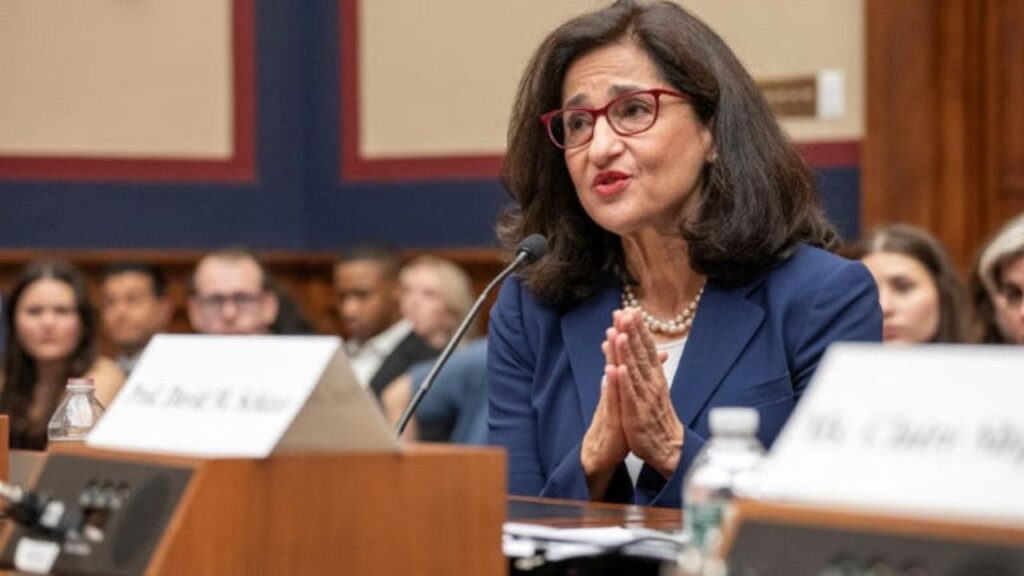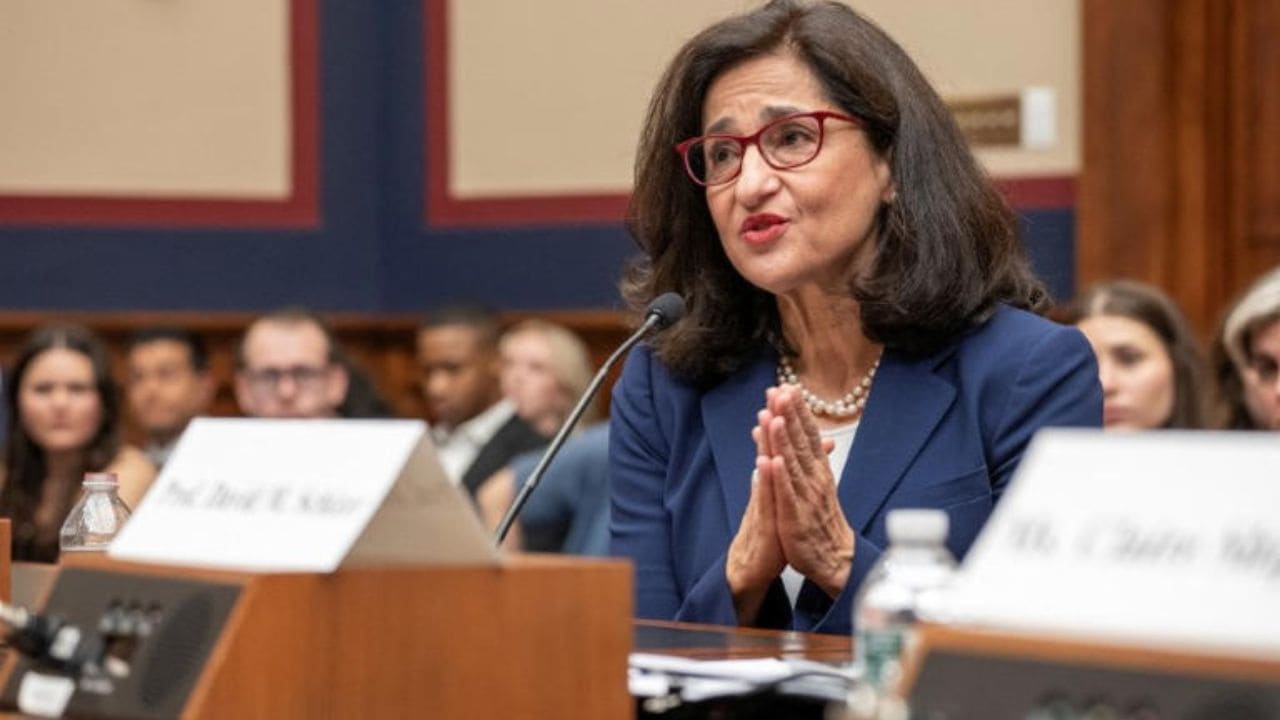Columbia University president resignation, Minouche Shafik resignation, Gaza protests at Columbia, Ivy League leadership changes, Columbia University campus protests, Gaza conflict and academia, student activism Columbia University
Explore the circumstances leading to Columbia University President Minouche Shafik’s resignation amid ongoing campus protests over the Gaza conflict. This article delves into the university’s challenges, student activism, and the broader implications for Ivy League leadership during times of global political unrest.
Columbia University, one of the most prestigious Ivy League institutions in the United States, is facing a significant leadership change as President Minouche Shafik resigned amid ongoing campus protests related to the Gaza war. Her resignation, announced nearly four months after the university’s handling of these protests drew widespread criticism, marks a crucial moment in the ongoing debate over the role of academic institutions in addressing complex global conflicts. The situation at Columbia reflects broader tensions within academia, where the intersection of free speech, activism, and administrative authority has become increasingly fraught.

Background: The Gaza Conflict and Campus Protests
The roots of the controversy at Columbia University can be traced back to the ongoing conflict between Israel and Palestine, particularly the war in Gaza. The latest escalation began on October 7, when Palestinian fighters from Hamas launched an attack on Israel, resulting in significant casualties and hostages. In response, Israel launched a military assault on Gaza, leading to widespread destruction, civilian casualties, and a humanitarian crisis that has captured global attention.
The conflict has deeply polarized opinions, both globally and within the United States, where support for Israel and Palestine varies widely among different communities. On college campuses, including Columbia, these divisions have manifested in protests, calls for divestment, and heated debates over the appropriate response to the violence in Gaza.
Columbia University’s Response and Leadership Challenges
As protests erupted on Columbia’s campus in April and May 2024, the university found itself at the center of a storm. Demonstrators, particularly those aligned with the Columbia University Apartheid Divest movement, occupied parts of the campus, calling for the university to divest from companies supporting Israel’s military actions and its occupation of Palestinian territories. The protests were a direct response to the increasing civilian deaths in Gaza, and they attracted significant media attention as well as involvement from various activist groups.
President Minouche Shafik, who had taken office just over a year earlier, faced intense pressure from both sides. Pro-Palestinian protesters criticized her for calling in the New York Police Department to disperse the encampments on campus, leading to over 100 arrests and numerous injuries. The decision to involve the police was met with outrage from students, faculty, and human rights organizations, who argued that it was an excessive use of force and an infringement on the right to peaceful protest.
On the other hand, pro-Israel groups and some political figures, including Republican U.S. Representative Elise Stefanik, criticized Shafik for not taking stronger action to protect Jewish students and to more forcefully clamp down on the protests. This criticism was echoed by other conservative voices who viewed the university’s response as insufficient in addressing what they perceived as rising anti-Semitism on campus.
The Aftermath of Shafik’s Resignation
Minouche Shafik’s resignation is significant not only because of the circumstances that led to it but also because of what it represents in the broader context of academic leadership. Shafik, an Egyptian-born economist with a distinguished career that included roles at the International Monetary Fund, the Bank of England, and the London School of Economics, had been seen as a capable and experienced leader. However, the campus unrest and the pressure from both pro-Palestinian and pro-Israel groups proved to be a considerable challenge for her administration.
In her resignation statement, Shafik cited the toll that the turmoil had taken on her family as a primary reason for stepping down. She also acknowledged the difficulties in reconciling the divergent views within the university community, highlighting the deep divisions that the Gaza conflict has exacerbated.
Following Shafik’s departure, Columbia University appointed Katrina Armstrong, the dean of Columbia’s medical school, as the interim president. Armstrong’s appointment comes at a critical juncture, as the university prepares for a new academic term starting on September 3, a date by which student protesters have vowed to resume their demonstrations.
Armstrong, in her initial statement as interim president, recognized the challenges that the university has faced over the past year. Her leadership will be tested as she navigates the ongoing protests and attempts to rebuild trust within the Columbia community.
Wider Implications for Ivy League Leadership
Shafik’s resignation is part of a broader trend of Ivy League presidents stepping down amid campus unrest related to the Gaza conflict. Liz Magill of the University of Pennsylvania resigned in December 2023, followed by Claudine Gay of Harvard in January 2024. These resignations underscore the immense pressures that university leaders are under when managing the delicate balance between upholding free speech and maintaining order on campuses that are increasingly becoming battlegrounds for ideological conflicts.
The departure of these leaders raises important questions about the role of university presidents in times of crisis. As institutions that pride themselves on fostering open debate and intellectual diversity, Ivy League universities are often at the forefront of contentious issues. However, the challenges of managing campus protests, particularly those related to deeply divisive global issues like the Israeli-Palestinian conflict, reveal the limitations of traditional academic leadership models.
Student and Faculty Reactions
The resignation of President Shafik has elicited a range of responses from the Columbia University community. Students involved in the protests, particularly those from Columbia University Apartheid Divest, have welcomed the resignation but cautioned against viewing it as a solution to the underlying issues. Mahmoud Khalil, a lead negotiator for the group, emphasized that the resignation should not distract from the ongoing efforts to push the university toward divestment from companies linked to Israel’s military activities.
Faculty members have expressed concerns about the impact of the leadership change on the university’s ability to address the ongoing campus tensions. Some have called for a more inclusive dialogue that takes into account the diverse perspectives within the Columbia community, while others have warned against the university becoming a platform for extremist views.
The broader academic community is also watching closely, as Columbia’s handling of the situation may set a precedent for how other universities navigate similar challenges. The balance between upholding academic freedom, protecting students, and managing campus activism is a complex one, and Columbia’s next steps will likely be scrutinized by both supporters and critics.
Looking Ahead: Challenges for Columbia University
As Columbia University prepares for the new academic term, it faces significant challenges in addressing the ongoing tensions related to the Gaza conflict. The resumption of protests in September, as announced by student groups, suggests that the campus unrest is far from over. Interim President Katrina Armstrong will need to work quickly to establish a strategy for managing these protests while ensuring that the university remains a safe and inclusive environment for all students.
One of the key issues that Armstrong and the university administration will need to address is the demand for divestment. The Columbia University Apartheid Divest movement, which has been at the forefront of the protests, is pushing for the university to sever ties with companies that they believe are complicit in the Israeli occupation of Palestinian territories. This demand is part of a broader global movement advocating for the Boycott, Divestment, and Sanctions (BDS) against Israel, a movement that has gained traction on many college campuses but remains highly controversial.
In addition to the divestment issue, Columbia will need to address concerns about free speech and academic freedom. The events of the past year have highlighted the difficulties in maintaining an open and respectful dialogue on contentious issues, and the university will need to find ways to foster a more constructive environment for debate.
Moreover, the university must consider the well-being of its students and faculty, many of whom have been deeply affected by the events of the past year. Ensuring that all members of the Columbia community feel safe and supported, regardless of their views on the conflict, will be a crucial task for the new administration.
Conclusion
The resignation of Minouche Shafik as President of Columbia University marks a significant moment in the ongoing debate over how academic institutions should handle contentious global issues like the Gaza conflict. Her departure, following months of campus protests and intense criticism from both pro-Palestinian and pro-Israel groups, underscores the challenges that university leaders face in navigating these complex situations.
As Columbia University moves forward under interim leadership, it will need to address the underlying issues that have contributed to the campus unrest while also preparing for the possibility of further protests. The events at Columbia reflect broader tensions within academia and society as a whole, where the intersection of global politics, activism, and education continues to pose difficult questions for university leaders.
The situation at Columbia is a reminder of the critical role that universities play in shaping public discourse and fostering an environment where diverse perspectives can be heard and debated. How Columbia handles this moment will not only impact its own community but also serve as a case study for other institutions facing similar challenges.
Read More
